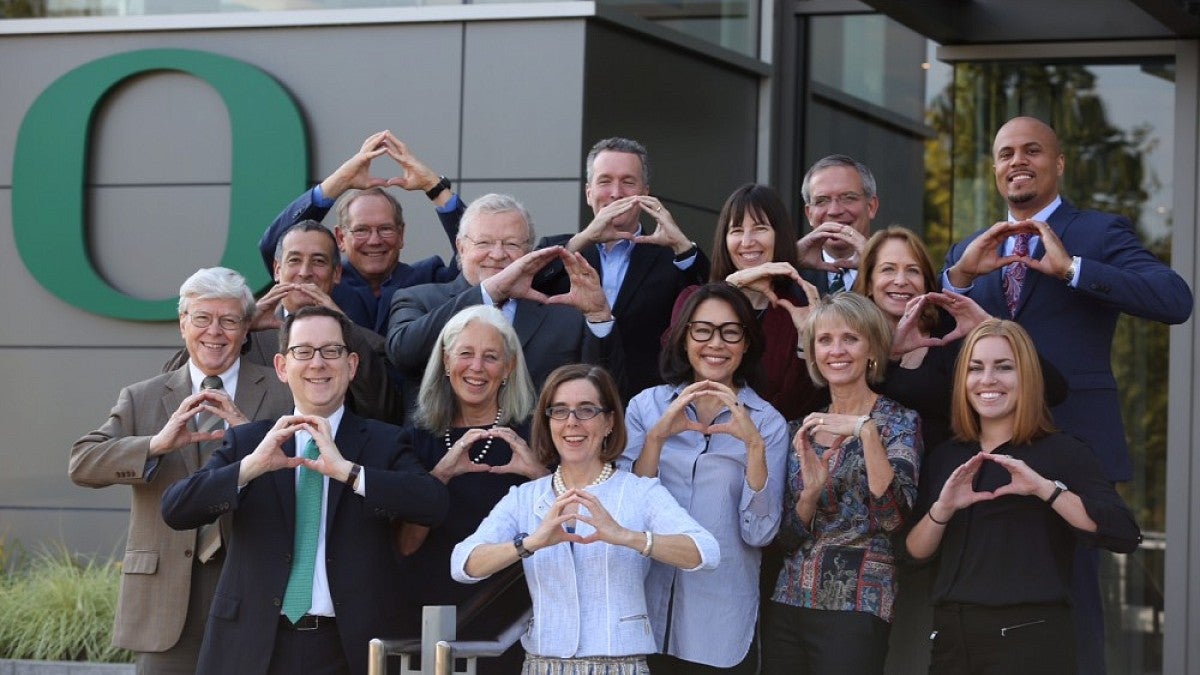Oregon Gov. Kate Brown said she supports the UO’s drive to become a world-class university and looks forward to working with its Board of Trustees to secure “stable and adequate” funding for higher education in the state.
Brown, who became the state’s 38th governor earlier this year, met with trustees for the first time Friday during the board’s September meeting on campus. She praised the university for programs like PathwayOregon that make higher education more affordable for qualified Oregon students and for contributing to the innovation and entrepreneurship that are essential to the state’s economic health.
“I’m so excited to be a partner as we open the doors of opportunity for students across the entire state,” Brown said. “I believe that your leadership supporting students on their path is absolutely critical, and I think one great example of that is PathwayOregon.”
In a wide-ranging discussion, Brown talked about state funding for higher education, the state’s role now that separate boards govern its seven public universities, the future of the UO’s Portland programs, the role of universities in building the state’s economy and the need to improve high school graduation rates.
After making some opening comments, the governor asked the board what questions they had of her. UO President Michael Schill wanted to know whether the governor shared the university’s aspiration, one that is widely shared on campus, to enhance its reputation as a world-class research institution.
The short answer, Brown said, is “yes.”
“I think it’s a great opportunity for Oregon, and I think it’s a great opportunity for this particular institution,” she said. “Innovation, creativity, entrepreneurship — this is what makes Oregon great, and I think building on that with a world-class research facility will help us achieve greatness. And the only way we can do that is with your leadership.”
State funding was on the minds of several trustees. The Legislature boosted its allocation to higher education in the most recent session — the first significant increase since before the economic downturn — and board members quizzed the governor on the prospect for future increases.
While acknowledging the difficulty of economic forecasting, Brown said she wants to work with universities to better align higher education funding with university needs.
“I look forward to working with you to figure out how we can come together around a stable and adequate funding source,” she said.
Trustee Mary Wilcox asked the governor about the UO’s Portland programs. Brown said she supports the UO’s presence in the state’s largest city but called on the university to be careful and thoughtful in its approach and to work collaboratively with other schools, including community colleges, to meet student needs. Schill and Board Chair Chuck Lillis both agreed with the notion of collaboration across the state when it can benefit the UO and other Oregon universities.
Lillis also wanted to know more about the state’s Higher Education Coordinating Commission and how that relates to the role of governing boards. The HECC advises the governor and Legislature on education policy, helps develop budget requests and allocates funding to universities and community colleges.
Brown said she sees a clear distinction between the two, with the HECC working to collaborate and coordinate at the state level and boards of trustees governing the individual campuses.
“I think the rationale behind establishing the boards was to allow you all to innovate and to provide you the flexibility to move in the direction of excellence,” the governor said. “I think that’s the direction we’re heading in, and I think it’s the right direction.”
The board wrapped up two days of meetings Friday. A story on the board’s Thursday committee meetings is available here, and a story on other matters that came before the board is here.
—By Greg Bolt, Public Affairs Communications


